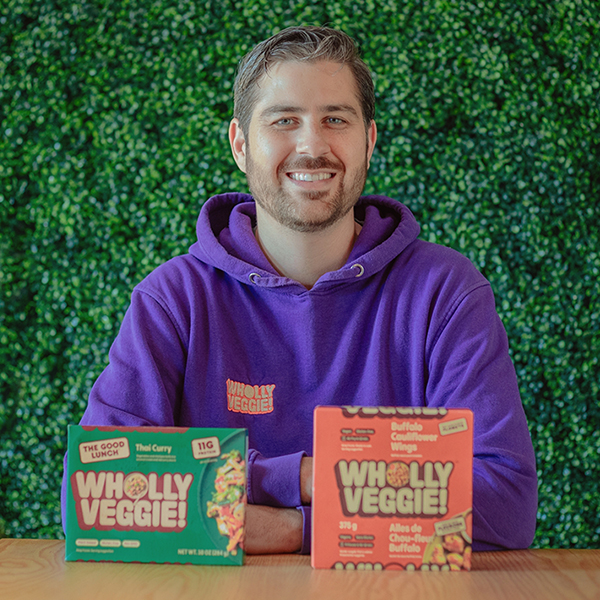On his first day as a student at McGill’s Faculty of Education, Philip Cutler, BEd’13, demonstrated his entrepreneurial streak. He asked his classmates if they’d give him a cut for every student he found for them to tutor.
Now his company Paper, which he co-founded with Roberto Cipriani, BSc’08, is one of the largest tutoring services in the U.S., hired by 110 public school districts to assist their students (mostly middle school and high school).
The Montreal-based company recently attracted more than $100 million USD in venture funding, and it has expanded its reach dramatically during the pandemic, going from 100 tutors to 1,000. More than a million students have been assisted by Paper tutors. The Globe and Mail recently called the company “one of Canada’s fastest-growing startups.”
Crucially, the Paper team’s model for providing educational support means every single kid at a school has access to quality help, not just those whose parents can afford it. Cutler’s own experience in classrooms as a teacher played a huge role in the thinking behind Paper’s approach.
“I began to realize the kids who were [using] private tutors were just [the ones from] wealthy families,” says Cutler. “Students who actually needed the help – 80 to 90 per cent of them – just didn’t have the resources to get that help. I wanted to find a way to bring [tutoring] online so that anybody could have access. Our goal is to … level the playing field for everyone.”
Cutler and Cipriani first began working together in 2013 when Cutler needed someone to build software for a previous business. Cipriani, a neuroscience graduate student at the time, enjoyed analyzing data and developing software to run experiments more than doing the experiments themselves.
When Cutler decided to create Paper (it was initially called GradeSlam), he reached out to Cipriani. “I pitched him on it and convinced him to start the company with me.”
Cutler believes his educational studies helped prepare him for his current duties as Paper’s CEO (Cipriani is the company’s chief operating officer and chief technology officer). He says he was taught at McGill to carefully think through the decisions he made.
His stint as a McGill football player offered similar lessons. “You spend an enormous amount of time watching yourself on film, reflecting on what happened. ‘How come you made [this] play, how come you didn’t make [that] play?’
Many factors distinguish Paper. For one thing, the student-educator interactions are entirely via chat.
Cipriani recalls that during their first year as a traditional one-to-one videoconferencing tutoring company, “in 75 per cent of all the sessions, the student would deny access to the camera and just chat with the tutor.”
Puzzled, he and Cutler did some research and found that most students weren’t comfortable talking to a stranger on the internet through video. “So, if they’re more comfortable through chat, then let’s make sure they can learn through chat,” Cipriani says.
When Cutler and Cipriani entered McGill’s Dobson Cup competition for fledgling companies in 2014 with their model of providing tutor support through chat communications, they “basically got laughed out of the room,” says Cutler with a chuckle. “I would have agreed if I didn’t hear it from hundreds of students.”
Once the Dobson judges better understood the reasoning behind Cutler and Cipriani’s approach, the laughing stopped, and the nascent tutoring service made it to the competition’s finals. Today, Cutler is regularly a Dobson Cup judge.
Another key realization for Cutler and Cipriani was that students didn’t want or need structured, scheduled tutoring. “The odds of a student needing 60 minutes of help is practically zero,” Cutler points out, “They might need 52 minutes of help, they might need 80 minutes.” Most just want to doublecheck that they’re on the right path, or need help getting unstuck on a particular problem.
Paper’s tutors are available around the clock to be consulted on demand, by chat, for however long or little the student needs, whether it’s at 7 pm on a Friday, or 2 pm on a Wednesday.
“For five minutes, for three hours, it’s tailored to their specific needs,” says Cutler. “Get help in a couple of seconds? It doesn’t exist except with us…. This will be a new standard of offering that schools have.”
By making tutors available 24/7, Cipriani says, students develop a relationship with the whole service, and not just with an individual tutor. It’s a bit like going to your favourite chain coffee shop and experiencing a consistency of quality in the service and product.
The teachers in the school districts that partner with Paper have also become fans of the company’s 24/7 availability. “Teachers love it because they don’t get requests at 10 at night from students,” says Cutler.
Students can receive tutoring support from Paper in one of four languages – English, French, Mandarin and Spanish. While Paper does work with some schools in Canada, the vast majority of its activity is focused on school districts in the U.S.
Most of Paper’s tutors are from within Canada. They have degrees in disciplines such as math, science and education, and some even have graduate degrees (handy for the upper year high school subjects). All are paid competitively.
“We treat this as an alternative career for educators,” says Cipriani. “It’s not a ‘gig’, it’s the career they choose.”
When learning differences require special support



